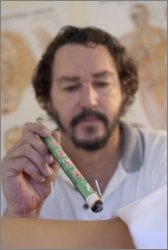Should Health Insurance Cover Alternative Treatments?
A Current Overview
by www.SixWise.com
In the United States, 36 percent of adults are using some
form of complementary and alternative medicine (CAM), according
to the National Center for Complementary and Alternative Medicine
(NCAM). Add in megavitamin therapy and prayer, and that number
rises to 62 percent.
|

Many insurance companies now cover acupuncture, massage
therapy and chiropractic care.
|
CAM therapies include alternative treatments such as:
-
Acupuncture
-
Chiropractic care
-
Massages
-
Yoga and Tai chi
-
Hypnosis
-
Meditation
-
Energy healing
-
Biofeedback
-
Ayurveda
|
|
Most people turn to CAM because they believe it will improve
their health when used in combination with conventional medical
treatments, according to a NCAM survey.
Others, however, turned to CAM because conventional medical
treatments did not help (28 percent) or because their conventional
medicine doctor recommended it (26 percent).
The survey also found that most Americans use CAM for chronic
health conditions including:
-
Back, neck, head or joint pain, or other chronic
pain
-
Colds
-
Anxiety or depression
-
Gastrointestinal disorders
-
Sleeping problems
Does Health Insurance Cover Alternative Treatments?
A survey of 18 major HMOs and insurance providers such as
Aetna, Medicare, Prudential, and Kaiser Permanente found that
14 of them covered at least 11 of 34 alternative therapies.
In fact, according to Kenneth R. Pelletier, Ph.D., M.D.,
author of The
Best Alternative Medicine: What Works? What Does Not?,
"Virtually every insurance carrier offers some form of
CAM coverage -- Blue Cross and Blue Shield, Aetna, Cigna,
Healthnet -- all of them."
The trend in health care is that more people are requesting
alternative treatments, and health insurance companies are
following suit.
"It's a very clear trend -- once they begin to offer
CAM benefits, most companies tend to continue and expand and
add on other services," says Pelletier.
|

One of the most common reasons why people seek alternative
treatments is to relieve chronic pain.
|
However, coverage varies by state and may be limited, often
allowing only a small number of sessions. Depending on your
policy, the coverage may not be comprehensive, but rather
just a discount on the typical costs.
Because of this, many people still pay for CAM out-of-pocket
at the time of service. The alternative treatments most often
covered by insurance are:
-
Chiropractic
-
Acupuncture
-
Massage therapy
-
Biofeedback
-
Naturopathy
Even government-backed insurance programs offer some alternative
coverage. For example:
-
The Department of Veterans Affairs may cover chiropractic
care and acupuncture.
-
Medicare covers chiropractic care (but does not cover
"alternative therapies" including acupuncture,
chelation therapy, biofeedback or holistic medicine).
-
Medicaid may cover some CAM, but coverage varies by state.
Americans spend an estimated $33 billion on CAM every year,
making it one of the most quickly expanding segments of the
health care industry. Experts agree that insurance coverage
for CAM is going to follow this trend.
How do You Know if You're Covered?
If you are thinking of trying an alternative treatment, you
can find out if you're covered by looking through your insurance
policy. It will list CAM therapies that are covered. You can
also call your agency and ask them what is covered, how much
is paid, and whether or not you need a referral.
Once you find out if your insurance company covers it, you
also need to make sure that the CAM practitioner accepts your
insurance.
What can you do if you're not covered? Ask the CAM practitioner
if they offer a sliding scale for costs, based on your income
and how much you can afford to pay. At the very least, most
all practitioners will develop a payment plan for you, so
that you can pay off the balance over time.
Recommended Reading
The
Amazing Benefits of Massage and Different Types of Massage
Explained
What
is Reiki? The Benefits, Method and Background of This Universal
Life Energy Technique Explained
Sources
Revolution
Health Group September 28, 2007
National
Center for Complementary and Alternative Medicine